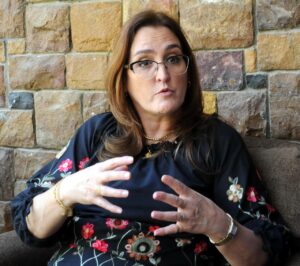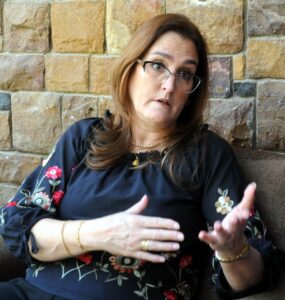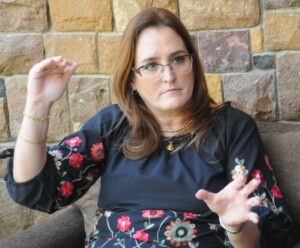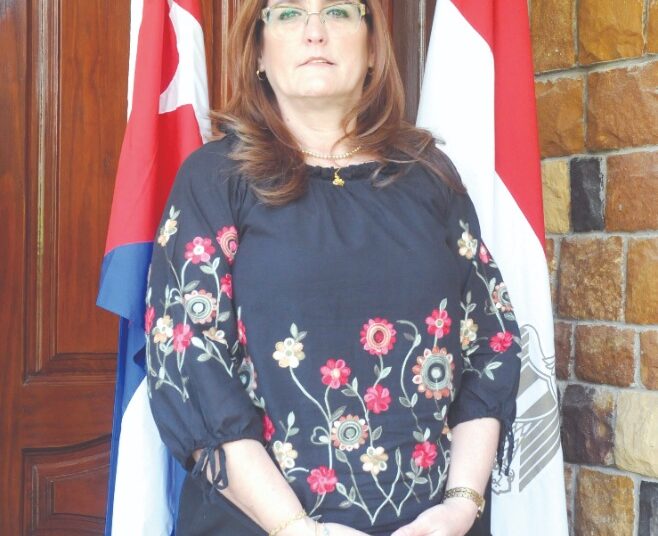Despite geographical distance, Egypt and Cuba enjoy rich, historical diplomatic relations dating back to Egypt’s opening of the Havana Commission in 1958. Then, Egypt raised the level of representation to having the embassy in 1959. In an interview with the Egyptian Mail, Cuban Ambassador to Egypt Tania Aguiar Fernandez reviews the history of bilateral ties and highlights promising areas for cooperation.

Promising medical co-operation
Earlier in April, the Cuban ambassador met Minister of Higher Education and Scientific Research, who is acting Health Minister Khaled Abdel Ghaffar to discuss means to broaden co-operation in medical field, bearing in mind that Cuba has a leading experience in this field.
“It was very fruitful meeting. We have a lot of possibilities to co-operate in the field of public health and higher education,” the ambassador said.
“We discussed co-operation in vaccines. Also, we can share all our research and knowledge related to diseases like diabetes. Definitely, we will build on this meeting,” she added.
According to the ambassador, the area of biotechnology, the drug industry and public health would be a mutually beneficial area.
The ambassador went on to highlight medical progress in Cuba. Cuba is internationally recognised for drug research and development.
“I can give you an example, Heberprot-P, a drug that cures diabetic foot ulcers. There is none other like it in the world. Likewise, Cuba has developed the only therapeutic vaccine against a type of lung cancer, with more than proven results.”

Addressing economic challenges
Regarding economic co-operation, the ambassador said one of the embassy’s main objectives in Egypt has been to build trade and economic ties.
“Although we have a high degree of coordination, we have much work to be done to develop, strengthen and deepen relations between our countries,” she said, adding that there is no legal or political impediment preventing trade exchange. The issue today is to identify the main areas and incentives, she said.
“In the past, we had a modest but stable commercial exchange, but for various reasons that have nothing to do with the will of the parties, but with the rearrangement of markets.
“This exchange was decreasing, which we have been trying to reverse with our work in Egypt,” the ambassador said.
In April 2021, a memorandum of understanding (MoU) was signed between the Cuban Chamber of Commerce and the Egyptian Chamber of Commerce. A virtual meeting was held recently between the Cuban Chamber of Commerce and the Federation of Egyptian Chambers of Commerce, in addition to the participation of directors from both institutions.
“We took advantage of that space and extended an invitation to them to participate in the upcoming International Fair of Havana, a space in which businessmen from various countries of the world attend every year. It is the largest of its kind in Cuba and one of the largest in Latin America and will take place November 14-18, 2022,” the ambassador said.
There are several trade agreements between the two countries and some are in the review stages. An exchange agreement on cultural matters was signed last February, in addition to the one mentioned between the Chambers of Commerce, an important agreement that will allow the re-launch of trade between both countries.
“We think it is a good starting point.”

Environment and sports co-operation
The Cuban embassy is trying to strengthen relations in terms of environment conservation and accompany Egypt in its efforts for the successful development of the COP27 on climate change.
“I take this opportunity to wish the Egyptian government and people my most sincere wishes that this important meeting be a success. I am sure they will make it,” the ambassador said.
Cuba is also recognised as a world power in various sports disciplines.
“This is an area in which we can support Egypt.”
Cuba also has the only internationally certified anti-doping laboratory in Central America, South America and the Caribbean region and this is of the utmost importance for Egyptian competitors to exchange experiences so that Egypt can have such an internationally certified laboratory.

Parliamentary co-operation
In this regard, there have been several meetings. The embassy maintains fluid communication with the Foreign Relations Committee of the Egyptian Parliament and with various parliamentarians.
“In the meetings we hold, we seem to be talking to each other as a family. There is a unique chemistry between us,” she said.
According to the ambassador, the most important thing is that there are so many common points. The Egyptian parliament, like that of Cuba, is focused on improving the living conditions of the population and has a heavy parliamentary agenda.
“We are working together to establish inter-parliamentary co-operation ties, on which rapid progress will be made as soon as the conditions imposed by Covid-19 allow it,” she added.
Eagerness for Cuban Culture
The ambassador believes that in Egypt there is eagerness for Cuban culture, especially for music, ballet and cinema. In Cuba, there is interest in Egyptian culture and history.
Important exponents of Cuban culture have come to Egypt to show their art, such as the National Ballet of Cuba, recognised as one of the best in the world.
On the possibility of having Cuban Culture Centre, the ambassador said it would be “fantastic”, but the conditions for it have not yet been created.
“But it is something that could be considered in the future, when conditions allow. It would be a very interesting meeting point to discover not only Cuban culture, but also its people, its customs, its nature and its history.”
Women’s empowerment
The ambassador hailed the remarkable interest from the Egyptian government, parliament and institutions in general to move forward firmly, quickly and with determination in everything related to women’s rights.
“The results are evident: Every day you can see more women in management positions, at the forefront of important tasks for the country and decision-making.
“Life has shown that women have as much preparation and desire to get ahead as men. Thinking that women should only take care of housework is a tremendous mistake and archaic thinking.”






Discussion about this post